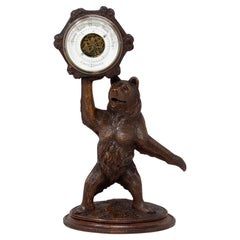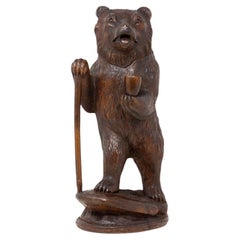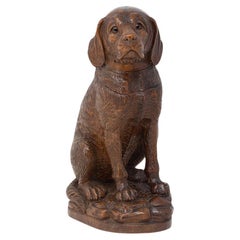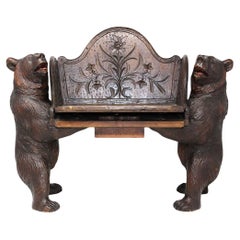Want more images or videos?
Request additional images or videos from the seller
1 of 15
Swiss Black Forest Bear Hand Carved Table Mirror
$4,766.56List Price
About the Item
- Creator:Black Forest (Manufacturer)
- Dimensions:Height: 25.2 in (64 cm)Width: 10.04 in (25.5 cm)Depth: 7.09 in (18 cm)
- Style:Black Forest (Of the Period)
- Materials and Techniques:
- Place of Origin:
- Period:
- Date of Manufacture:Circa 1890
- Condition:Wear consistent with age and use. Minor losses. Minor structural damages. Very Good antique condition – one repair to leg and two small losses to the top branch.
- Seller Location:Newark, GB
- Reference Number:Seller: YERD1stDibs: LU6971244335692
About the Seller
5.0
Gold Seller
Premium sellers maintaining a 4.3+ rating and 24-hour response times
Established in 2019
1stDibs seller since 2022
39 sales on 1stDibs
Typical response time: 2 hours
Authenticity Guarantee
In the unlikely event there’s an issue with an item’s authenticity, contact us within 1 year for a full refund. DetailsMoney-Back Guarantee
If your item is not as described, is damaged in transit, or does not arrive, contact us within 7 days for a full refund. Details24-Hour Cancellation
You have a 24-hour grace period in which to reconsider your purchase, with no questions asked.Vetted Professional Sellers
Our world-class sellers must adhere to strict standards for service and quality, maintaining the integrity of our listings.Price-Match Guarantee
If you find that a seller listed the same item for a lower price elsewhere, we’ll match it.Trusted Global Delivery
Our best-in-class carrier network provides specialized shipping options worldwide, including custom delivery.You May Also Like
Black Forest Carved Swiss Entry Mirror with Climbing Bears
By Black Forest
Located in Coeur d'Alene, ID
Large Swiss Black Forest carved entry or hall mirror with climbing bears both sides and pine boughs with pine cones at top and bottom. Carved by Swiss mas...
Category
2010s Swiss Black Forest Mirrors
Materials
Other
Antique Black Forest Mirror with Rustic Bear Carvings, ca. 1900
Located in Berghuelen, DE
Antique black forest mirror with rustic bear carvings ca. 1900
A large crescent vanity mirror in a handcarved wooden frame featuring two ...
Category
Early 20th Century German Black Forest Table Mirrors
Materials
Wood
$2,485
H 16.54 in W 11.82 in D 8.27 in
19th Century French Black Forest Carved Walnut Hand Mirror with Beveled Glass
Located in Dallas, TX
Crafted in France circa 1870, the antique Louis XV style hand mirror with elegant serpentine handle, features hand carved floral and leaf motifs throughout the frame; the vanity mirr...
Category
Antique Mid-19th Century French Black Forest Table Mirrors
Materials
Mercury Glass, Walnut
$575
H 12.75 in W 6 in D 1 in
19th C Black Forest Dressing Table w/ Drawer and Mirror
Located in Houston, TX
Elevate your decor with a touch of 19th-century beauty! This Carved French Oak Black Forest Tilting Tabletop Dresser is functional as well as elegant....
Category
Antique 19th Century French Black Forest Table Mirrors
Materials
Mirror, Oak
Antique French Mirror Black Forest Oak Framed or Standing Mirrored Firescreen
Located in Tyler, TX
Exquisite 19th century antique French Qak Black Forest beveled framed mirror or firescreen~~c. 1880s
We were fortunate enough to obtain this outstanding mirror or firescreen and other contents of a French castle estate~~most certainly commissioned pieces for a family of wealth or royalty~~High quality 19th century Black Forest, Gothic and Renaissance Revival pieces in spectacular condition
Black Forest furniture...
Category
Antique Late 19th Century French Black Forest Mantel Mirrors and Firepla...
Materials
Mirror, Oak
$2,500
H 44.5 in W 27.5 in D 17 in
Table Mirror – Hand-carved Limestone Pedestal w/ Circular Mirror
By Mike Newins
Located in Philadelphia, PA
A sculptural table mirror addressing tension and balance.
Mike Newins is a self taught craftsperson and interdisciplinary designer based in central North Carolina. Working within t...
Category
2010s American Modern Table Mirrors
Materials
Limestone
Swiss Designer, Table Mirror, Wood, Switzerland, 1930s
Located in High Point, NC
A small hand-carved Dornash-school wood table mirror designed and produced in Switzerland, c. 1930s.
Dimensions: 5.55” H x 7.25” W x 1.25” D
Category
Vintage 1930s Swiss Table Mirrors
Materials
Wood
Black Forest Vanity / Dressing Mirror
Located in Stamford, CT
A rare Black Forest vanity / dressing mirror with gargoyle supports having naturalistic tree branch motif and elaborately carved oak leaves. Swivel...
Category
Antique 1870s Table Mirrors
Materials
Wood
Golden Hand Carved Wood Mirror
By Loyzaga
Located in Mexico, Ciudad de México
Vendôme Pearl Mirror
Hand-Carved Wood With Gold Leaf Finish
This collection is inspired in Paris most beautiful square, Place Vendôme. The rich and var...
Category
2010s Mexican Wall Mirrors
Materials
Wood
19th Century Swiss 'Black Forest' Hand-Carved Walnut Wall Mirror
Located in London, GB
A Black Forest Carved Mirror
Carved from walnut, the bevelled oval mirror plate set within an architectural frame and flanking rustic branc...
Category
Antique 19th Century Swiss Black Forest Wall Mirrors
Materials
Wood
More From This Seller
View AllSwiss Black Forest Bear Barometer
By Black Forest
Located in Newark, England
FREE WORLDWIDE SHIPPING
From our Swiss Black Forest collection, we are delighted to present this exceptional Swiss Black Forest Bear Barometer, dating to circa 1890. Expertly hand ...
Category
Antique Late 19th Century Swiss Black Forest Table Clocks and Desk Clocks
Materials
Glass, Wood
Rare Model Swiss Black Forest Bear Tobacco Jar
By Black Forest
Located in Newark, England
Rare and Unique Model
From our Black Forest collection, we are delighted to introduce this rare example Swiss Black Forest Bear Tobacco Jar. The Bear Tobacco Jar carved from Linden ...
Category
Antique Late 19th Century Swiss Black Forest Animal Sculptures
Materials
Wood
Swiss Hand Carved Antique Black Forest Dog Tobacco Jar
By Black Forest
Located in Newark, England
VERY RARE SEATED DOG
From our Black Forest collection, we are delighted to offer this rare Swiss Black Forest Carved Dog Tobacco Jar. The Tobacco Jar beautifully modelled with an o...
Category
Antique Late 19th Century Swiss Black Forest Snuff Boxes and Tobacco Boxes
Materials
Wood
Antique Swiss Black Forest Carved Bear Musical Childs Chair
By Black Forest
Located in Newark, England
Musically activated when sat upon
From our Black Forrest collection, we are thrilled to offer this fine and rare Swiss Black Forest Bear carved musical child’s chair. The chair of b...
Category
Antique Late 19th Century Swiss Art Nouveau Children's Furniture
Materials
Wood
Rare Swiss Black Forest Blacksmiths Anvil Tobacco Jar Compendium with Secret
By Black Forest
Located in Newark, England
Cigar Cutter & Vesta Case
From our Black Forest collection, we are delighted to offer this very rare and unusual Swiss Black Forest carving of a tobacco jar shaped as a Blacksmiths Anvil complete with secret compartment and secret catch. The Black Forest Anvil stands upon a wooden tree trunk base realistically carved with wood knots. Beside the anvil sits an ebonised decorative carved hammer and a pair of pliers that have a cigar cutter built in between them. When the cigar is placed and cut using the pliers, the cap end falls into a basket through a small chute carved into the side of the trunk. The Anvil at the top of the contains a hidden vesta compartment for storing matches and is accessed via the hidden horse shoe catch in the top of the anvil when turned a quarter the catch releases and the top of the anvil can be removed. To access the tobacco jar in the centre a second secret catch can be pushed to unlock the lid which pivots open. To open the catch a small oval section of the base must be pressed down which releases the spring loaded lid. The hollowed centre contains the original foil lining for storing the tobacco. The Black Forest Tobacco Jar...
Category
Antique Early 1900s Swiss Black Forest Snuff Boxes and Tobacco Boxes
Materials
Wood
Antique Swiss Black Forest Wood and Marble Lucerne Lion Carving
By Black Forest
Located in Newark, England
Mounted on a Black Marble Plinth
From our Black Forest collection, we are delighted to introduce this Swiss Black Forest Lucerne Lion Carving. The Lucern...
Category
Antique Late 19th Century Swiss Art Nouveau Animal Sculptures
Materials
Marble
Recently Viewed
View AllMore Ways To Browse
Perimeter Table
Tree Bench
Black Forest Carved Table
Antique Tree Seat
Antique Clock Box
Antique Black Forest Mirrors
Black Forest Bear Hall Stand
19th Century German Black Forest Mirror
Black Forest Bear Hall Tree
Beged Or
Black Bear Table
Black Forest Walnut Music Box
Black Forest Bear Table
Brass Pivot Mirror
Brot Mirophar
Vintage Filigree Vanity
Vintage Mirror Tray Vanity
Bvlgari Mirror



